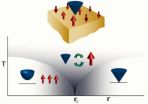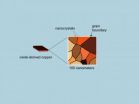(Press-News.org) Rochester, Minn. — Rheumatoid arthritis patients are likelier than the average person to develop chronic kidney disease, and more severe inflammation in the first year of rheumatoid arthritis, corticosteroid use, high blood pressure and obesity are among the risk factors, new Mayo Clinic research shows. Physicians should test rheumatoid arthritis patients periodically for signs of kidney problems, and patients should work to keep blood pressure under control, avoid a high-salt diet, and eliminate or scale back medications damaging to the kidneys, says senior author Eric Matteson, M.D., Mayo rheumatology chair. The study is published in the American Journal of Kidney Diseases, the National Kidney Foundation journal .
Researchers studied 813 Mayo Clinic patients with rheumatoid arthritis and 813 without it. They found that over a 20-year period, people with rheumatoid arthritis have a 1 in 4 chance of developing chronic kidney disease, compared with the general population's 1-in-5 risk.
"That might not seem like a lot, but in fact that's quite a big difference, and it has important implications for the course of rheumatoid arthritis and for the management of the disease," Dr. Matteson says.
In addition, heart disease is more common in rheumatoid arthritis patients who have chronic kidney disease, he adds.
Factors contributing to a higher kidney disease risk for rheumatoid arthritis patients include use of corticosteroids such as prednisone and cortisone; a higher "sed rate" — a blood test that measures inflammation — in the first year of rheumatoid arthritis; obesity; hypertension; and dyslipidemia, abnormally high cholesterol in the blood, according to the study.
There are currently no medical guidelines specifically for the management of chronic kidney disease in rheumatoid arthritis, says Dr. Matteson, adding that he hopes the research will make physicians more alert to the risk of kidney disease in rheumatoid arthritis and lead to guidelines.
Dr. Matteson recommends that physicians be careful about the medications they give people with rheumatoid arthritis, to reduce the risk of medication-induced kidney disease. Rheumatoid arthritis patients should have blood tests and urine analysis once a year or more often to detect kidney problems, depending on the medications they are taking and on other conditions such as diabetes and high blood pressure they may have, he says.
"Kidney disease in patients with rheumatoid arthritis can be detected very simply, and the techniques are the same as are used in the general population," Dr. Matteson says.
To reduce their risk of developing kidney disease, patients should be attentive to their blood pressure and keep it under control, maintain a diet that isn't high in salt; avoid or reduce use of medications that are directly toxic to the kidneys; including nonsteroidal anti-inflammatory drugs; and get their rheumatoid arthritis and inflammation under as good of control as possible, he adds.
More research is planned to understand contributors to kidney disease in rheumatoid arthritis and how to intervene to reduce the risk, Dr. Matteson says.
INFORMATION:
The study was supported by National Institute of Arthritis and Musculoskeletal and Skin Diseases grant R01 AR46849 and by National Institute on Aging grant R01AG034676.
About Mayo Clinic
Recognizing 150 years of serving humanity in 2014, Mayo Clinic is a nonprofit worldwide leader in medical care, research and education for people from all walks of life. For more information, visit 150years.mayoclinic.org, MayoClinic.org or http://newsnetwork.mayoclinic.org/.
MEDIA CONTACT: Sharon Theimer, Mayo Clinic Public Affairs, 507-284-5005, Email: newsbureau@mayo.edu
Vigilance for kidney problems key for rheumatoid arthritis patients
Rheumatoid arthritis patients are at higher risk of kidney disease, the research shows
2014-04-09
ELSE PRESS RELEASES FROM THIS DATE:
Researchers discover dangerous ways computer worms are spreading among smartphones
2014-04-09
VIDEO:
Professor Kevin Du and his team at Syracuse University have identified apps that could cause problems for smartphone users, allowing hackers easy access to sensitive information.
Click here for more information.
Professor Kevin Du and a team of researchers from the College of Engineering and Computer Science at Syracuse University have recently discovered that some of the most common activities among smartphone users—scanning 2D barcodes, finding free Wi-Fi access points, ...
Stanford scientists model a win-win situation: Growing crops on photovoltaic farms
2014-04-09
Growing agave and other carefully chosen plants amid photovoltaic panels could allow solar farms not only to collect sunlight for electricity but also to produce crops for biofuels, according to new computer models by Stanford scientists.
This co-location approach could prove especially useful in sunny, arid regions such as the southwestern United States where water is scarce, said Sujith Ravi, who is conducting postdoctoral research with professors David Lobell and Chris Field, both on faculty in environmental Earth system science and senior fellows at the Stanford Woods ...
Medication therapy management works for some but not all home health patients
2014-04-09
WEST LAFAYETTE, Ind. — Low-risk Medicare patients entering home health care who received medication therapy management by phone were three times less likely to be hospitalized within the next two months, while those at greater risk saw no benefit, according to a study led by Purdue University.
The study helped determine which patients benefit most from medication therapy management by phone and a way to identify them through a standardized risk score, said Alan Zillich, associate professor of pharmacy practice at Purdue, who led the research.
"Hopefully, this study ...
UC-led research finds chips with olestra cause body toxins to dip
2014-04-09
According to a clinical trial led by University of Cincinnati researchers, a snack food ingredient called olestra has been found to speed up the removal of toxins in the body.
Results are reported in the April edition of the Journal of Nutritional Biochemistry.
The trial demonstrated that olestra—a zero-calorie fat substitute found in low-calorie snack foods such as Pringles—could reduce the levels of serum polychlorinated biphenyls (PCBs) in people who had been exposed to PCBs.
High levels of PCBs in the body are associated with an increase in hypertension and diabetes. ...
Gusev Crater once held a lake after all, says ASU Mars scientist
2014-04-09
TEMPE, Ariz. - If desert mirages occur on Mars, "Lake Gusev" belongs among them. This come-and-go body of ancient water has come and gone more than once, at least in the eyes of Mars scientists.
Now, however, it's finally shifting into sharper focus, thanks to a new analysis of old data by a team led by Steve Ruff, associate research professor at Arizona State University's Mars Space Flight Facility in the School of Earth and Space Exploration. The team's report was just published in the April 2014 issue of the journal Geology.
The story begins in early 2004, when NASA ...
One kind of supersymmetry shown to emerge naturally
2014-04-09
UC Santa Barbara physicist Tarun Grover has provided definitive mathematical evidence for supersymmetry in a condensed matter system. Sought after in the realm of subatomic particles by physicists for several decades, supersymmetry describes a unique relationship between particles.
"As yet, no one has found supersymmetry in our universe, including at the Large Hadron Collider (LHC)," said the associate specialist at UCSB's Kavli Institute for Theoretical Physics (KITP). He is referring to the underground laboratory in Switzerland where the famous Higgs boson was identified ...
Violence intervention program effective in Vanderbilt pilot study
2014-04-09
Violent behavior and beliefs among middle school students can be reduced through the implementation of a targeted violence intervention program, according to a Vanderbilt study released in the Journal of Injury and Violence Research.
Manny Sethi, M.D., assistant professor of Orthopaedic Surgery and Rehabilitation, and his Vanderbilt co-authors evaluated 27 programs nationwide as part of a search for an appropriate school-based violence prevention program.
Their findings led to a single, evidence-based conflict resolution program that was evaluated in a pilot study of ...
Stanford scientists discover a novel way to make ethanol without corn or other plants
2014-04-09
Stanford University scientists have found a new, highly efficient way to produce liquid ethanol from carbon monoxide gas. This promising discovery could provide an eco-friendly alternative to conventional ethanol production from corn and other crops, say the scientists. Their results are published in the April 9 advanced online edition of the journal Nature.
"We have discovered the first metal catalyst that can produce appreciable amounts of ethanol from carbon monoxide at room temperature and pressure – a notoriously difficult electrochemical reaction," said Matthew ...
Novel approach to accelerate metabolism could lead to new obesity treatment
2014-04-09
BOSTON – By manipulating a biochemical process that underlies cells' energy-burning abilities, investigators at Beth Israel Deaconess Medical Center (BIDMC) have made a novel discovery that could lead to a new therapy to combat obesity and diabetes.
Published in the April 10 issue of the journal Nature, the new findings show that reducing the amount of nicotinamide N-methyltransferase (NNMT) protein in fat and liver dramatically reduces the development of obesity and diabetes in mice.
'With this discovery, we now have a means of metabolic manipulation that could ...
A bad penny: Cancer's thirst for copper can be targeted
2014-04-09
DURHAM, N.C. – Drugs used to block copper absorption for a rare genetic condition may find an additional use as a treatment for certain types of cancer, researchers at Duke Medicine report.
The researchers found that cancers with a mutation in the BRAF gene require copper to promote tumor growth. These tumors include melanoma, the most dangerous form of skin cancer that kills an estimated 10,000 people in the United States a year, according to the National Cancer Institute.
"BRAF-positive cancers like melanoma almost hunger for copper," said Christopher M. Counter, ...
LAST 30 PRESS RELEASES:
Natural selection operates on multiple levels, comprehensive review of scientific studies shows
Developing a national research program on liquid metals for fusion
AI-powered ECG could help guide lifelong heart monitoring for patients with repaired tetralogy of fallot
Global shark bites return to average in 2025, with a smaller proportion in the United States
Millions are unaware of heart risks that don’t start in the heart
What freezing plants in blocks of ice can tell us about the future of Svalbard’s plant communities
A new vascularized tissueoid-on-a-chip model for liver regeneration and transplant rejection
Augmented reality menus may help restaurants attract more customers, improve brand perceptions
Power grids to epidemics: study shows small patterns trigger systemic failures
Computational insights into the interactions of andrographolide derivative SRJ09 with histone deacetylase for the management of beta thalassemia
A genetic brake that forms our muscles
CHEST announces first class of certified critical care advanced practice providers awarded CCAPP Designation
Jeonbuk National University researchers develop an innovative prussian-blue based electrode for effective and efficient cesium removal
Self-organization of cell-sized chiral rotating actin rings driven by a chiral myosin
Report: US history polarizes generations, but has potential to unite
Tiny bubbles, big breakthrough: Cracking cancer’s “fortress”
A biological material that becomes stronger when wet could replace plastics
Glacial feast: Seals caught closer to glaciers had fuller stomachs
Get the picture? High-tech, low-cost lens focuses on global consumer markets
Antimicrobial resistance in foodborne bacteria remains a public health concern in Europe
Safer batteries for storing energy at massive scale
How can you rescue a “kidnapped” robot? A new AI system helps the robot regain its sense of location in dynamic, ever-changing environments
Brainwaves of mothers and children synchronize when playing together – even in an acquired language
A holiday to better recovery
Cal Poly’s fifth Climate Solutions Now conference to take place Feb. 23-27
Mask-wearing during COVID-19 linked to reduced air pollution–triggered heart attack risk in Japan
Achieving cross-coupling reactions of fatty amide reduction radicals via iridium-photorelay catalysis and other strategies
Shorter may be sweeter: Study finds 15-second health ads can curb junk food cravings
Family relationships identified in Stone Age graves on Gotland
Effectiveness of exercise to ease osteoarthritis symptoms likely minimal and transient
[Press-News.org] Vigilance for kidney problems key for rheumatoid arthritis patientsRheumatoid arthritis patients are at higher risk of kidney disease, the research shows





